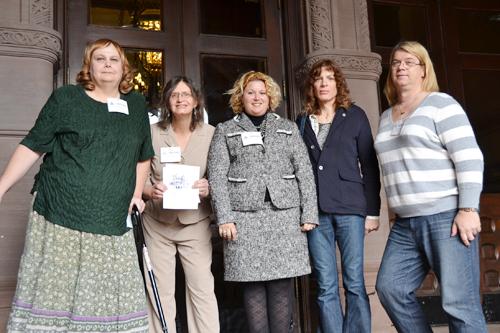On the eve of the Trans Day of Remembrance, Attorney General Chris Bentley dismissed the latest appeal to amend the Ontario Human Rights Code to include gender identity.
Xtra joined members of the Ontario Trans Human Rights Campaign to listen to the short discussion on the floor of the Ontario legislature during question period on Thursday morning. As soon as NDP MPP Cheri DiNovo reintroduced the private member’s bill, Bentley shot it down.
“The attorney general could make the change tomorrow,” DiNovo tells Xtra afterward, sounding exhausted and frustrated. “They have a majority government. They could change this tomorrow. Why won’t they?
“We are moving farther under a federal Conservative government on this issue than we are under a provincial Liberal one. It’s a sad day when Conservatives are more progressive than Liberals.”
In question period, Bentley said transgendered and transsexual people are already protected under the Ontario Human Rights Code.
“It is not helpful in any way, shape or form to say that there is some challenge with the existing protection,” he said. “There are not. The protections are there for those who need them. And for those who even think they can discriminate: do not.
“The law prohibits it. The decisions are clear. The protections exist. We reject all forms of discrimination in this province.”
Trans activist Susan Gapka, who was watching from the visitor gallery, says it’s disappointing to see another missed opportunity.
So the fight continues, says trans activist Stefonknee Wolscht. Bentley’s “implied human rights” leaves too much grey area, she says. Trans people are regularly discriminated against in hospitals, in the courts, in employment and in the media.
“This is all about visibility, and with visibility there’s credibility,” says trans activist Martine Stonehouse. “I compare this to the persons case of 1929 when five women petitioned the government so that women could be recognized as persons in this country.
“This is the same thing. We want recognition and visibility in the Human Rights Code. We don’t want to be buried under sex or disability. It costs nothing to put this in the code. But by not putting it in, it will lead to endless court challenges, human rights cases and cost government and taxpayers money.”
DiNovo first introduced Toby’s Act as a private member’s bill in 2007. Named in honour of Toby Dancer, a music producer and transsexual, Bill 186 would amend the Ontario Human Rights Code. This is the fifth time she’s introduced the bill, she says.
When she stood in the legislature, DiNovo reminded MPPs that 50 percent of trans people live below the poverty line and 41 percent attempt suicide.
In employment, 97 percent of trans people face discrimination, proving that Bentley’s policy is not working, she said.
“This is a principled position we are asking them for,” DiNovo says. “Are they frightened of some backlash? Is this a popularity contest? This is not going to hurt anyone and will help many.
“We are seeing a general shift to the right in this province. We saw this in the municipal election as well.”
A similar piece of legislation is being debated at the federal level. The justice committee of the House of Commons passed Bill C-389, an act to amend the Canadian Human Rights Act to include gender identity and gender expression. The bill must now go through another reading and debate.
What’s the next step? DiNovo says generating more and more public support will be key to putting pressure on the provincial Liberals.
“Let’s hope the federal bill passes with flying colours. Let’s hope it’s not stymied or any other ugly thing occurs, and we will continue to push it here,” she says. “This is something we are going to win. It’s just a question of when.”
Gapka may be disappointed, but she’s not surrendering.
“We’ll just have to keep coming back to Queen’s Park,” she says. “There will be a little path worn into the floor. We’ve only begun to fight.”

 Why you can trust Xtra
Why you can trust Xtra


